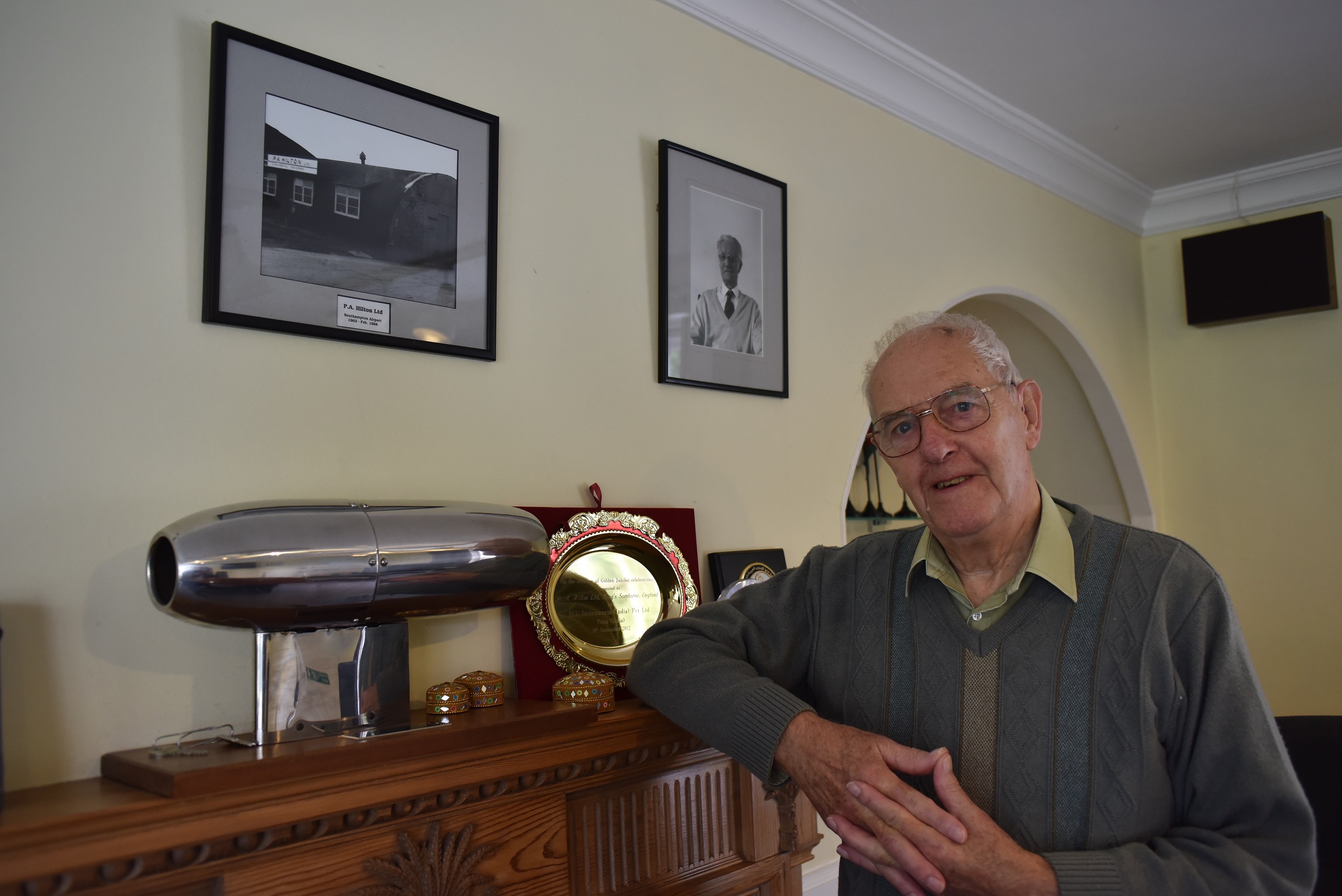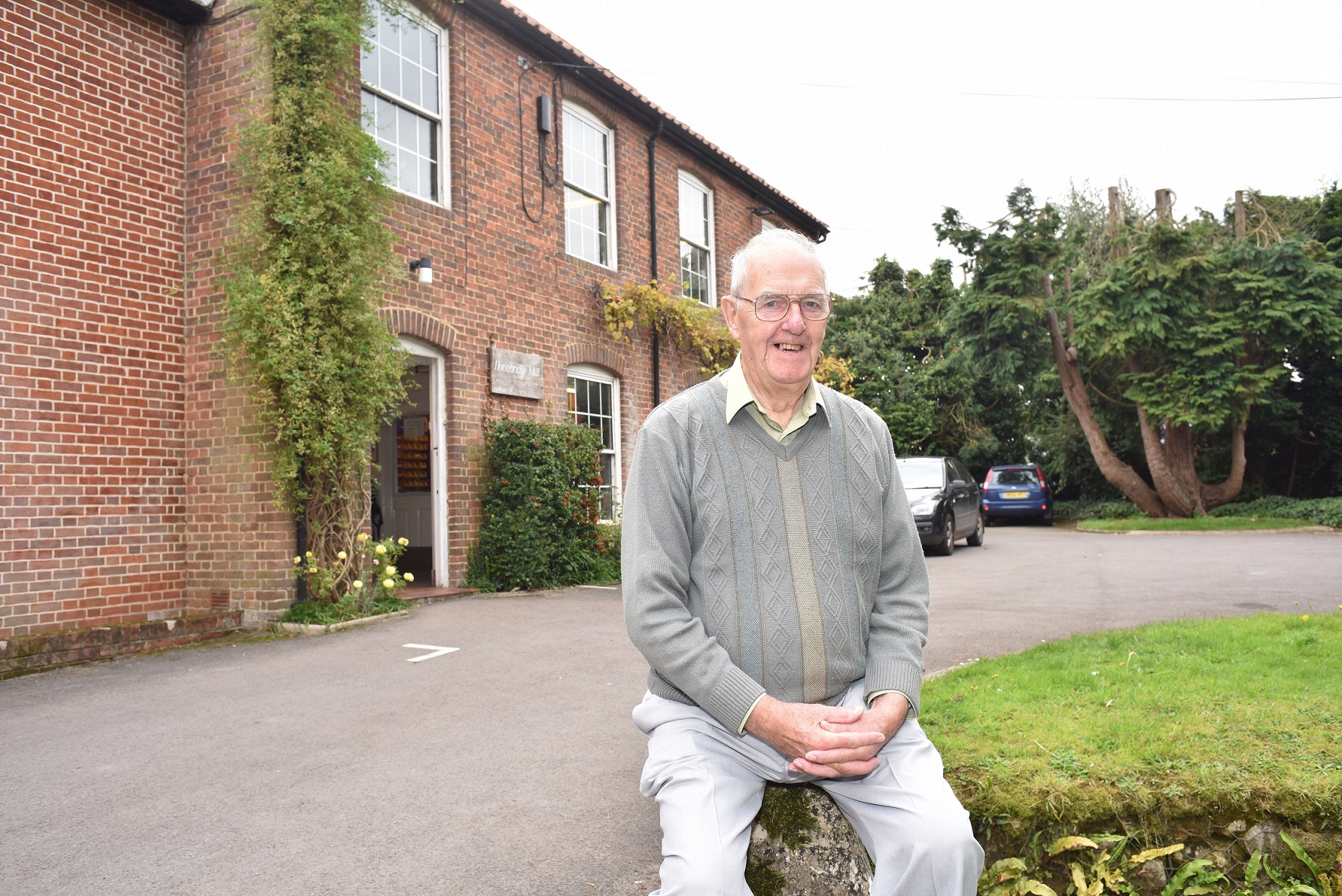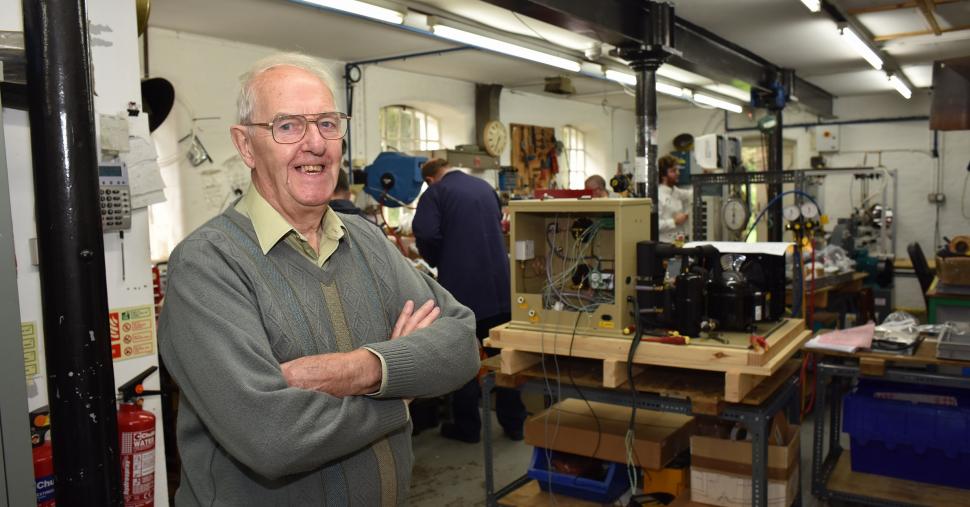His inventions have trained hundreds of thousands of young engineers across the globe and continue to be at the forefront of cutting-edge teaching equipment.
Gerry Hewett looks back on his 60-year career at PA Hilton with great pride and affection – and knows the company is in great hands as its pioneering approach trains the next generation of engineers.
Sitting in the boardroom at PA Hilton’s headquarters, at Horsebridge Mill in Hampshire, the chairman reflects on the extraordinary story of how the company was founded and its remarkable journey to become the leading quality provider in the market.
Engineering and all its theoretical and practical strands are part of Gerry’s DNA.He followed his father’s footsteps into aeronautical engineering and, after completing his apprenticeship in the mid-1950s, went on to complete his National Service in the RAF.
He met the company’s founder, Paul Hilton, in the most unlikely of places – and it wasn’t long before Paul’s flair for innovation and invention was rubbing off.
It was the start of a business partnership and friendship that laid the foundations to PA Hilton.
Gerry, 80, who lives in Hampshire, explains: “My wife and I couldn’t afford to buy a house because I had two years of national service hanging over me, so we moved into a caravan in Radlett, Hertfordshire.
“It was the summer of 1959 and we were introduced to Paul as he was living in the caravan next to us.
“It turned out Paul was a friend of my father and both had worked for De Havilland, a major aviation company at the time.”
Paul’s workshop was a chicken shed on the caravan site and he was building and experimenting on a number of machines. In his workshop Paul had a pre-First World War treadle lathe, which was used to cut cylindrical machinery parts and required leg power to operate the treadle.
Gerry says: “Being a time-served toolmaker, I could operate any machine tool. The combination of having strong cycling legs and having served a full engineering apprenticeship meant I was the ideal candidate to help Paul out. I was on very poor income from National Service, so I was very grateful.
“Whenever I had spare hours, I would work for Paul.”

Inventing the Ramjet
PA Hilton Ltd had been set up just a few months before, and during that summer Paul introduced Gerry to his invention – The Ramjet.
Gerry says: “Paul became very interested in using a device called a Ramjet for the purposes of helicopter propulsion.
“It was a specially-shaped open tube where you put fuel in at the front, blow in air, ignite the mixture and you had a difference in momentum between the front and back of the engine and that would give you the forward thrust. It was a very simple device to be mounted at the tip of a helicopter rotor blade.
“The thinking was that such a simple device would require a simple fuel system and would replace a very heavy gas turbine in the air frame of a helicopter. It promised to be potentially a very lucrative idea, but it didn’t quite work out that way.”
Paul, who had been an RAF pilot in the Second World War and was awarded the Conspicuous Gallantry Medal for his bravery, was spending his life savings researching and developing the Ramjet.
His employer, De Havilland, declined his offer of the Ramjet, but the device was soon raising eyebrows in other fields. Gerry explains: “Paul happened to write an article about the Ramjet in a house magazine called BP Air in 1959.
“A professor at Imperial College in London read the article and got in touch with him and asked if Paul would build the engine into a test rig for his students to analyse the performance of the engine.
“The professor wanted to measure fuel flow, pressures and temperatures throughout the engine.
“Paul designed the test rig and I built it in the workshop, which was the old chicken shed on the caravan site.”
So, the first PA Hilton product was sold to Imperial College in 1959 – and the orders soon started to follow.
Gerry says: “Paul wrote a brochure to showcase the Ramjet.
“He went to the local library and borrowed a publication called the World of Learning which lists universities and colleges around the world and faculties they had.
“Paul did a worldwide distribution of his brochure – and took orders very quickly from universities and defence academies.”
Gerry remembers fondly an old photograph of him building four Ramjets in the first stage of manufacture in the workshop.
In just two years, 17 of the Ramjets sold to universities across the globe, including Southampton University, where the device is still in use to this day.
Despite the humble surroundings, the company was built on a foundation of excellence in R&D, outstanding quality and technical expertise.
As the company grew, Paul knew bigger premises were needed and he relocated to Southampton Airport in 1964.
During this time, Paul and Gerry parted ways as Gerry went on to study engineering at the Hatfield College of Technology, now the University of Hertfordshire.
Gerry says: “He had to be careful where he moved the company to because the Ramjet is a pure jet engine and makes the noise of a jet engine.
“It produces about 115 decibels of noise at 1m and, in those days, there was so such thing as ear defenders.
“By moving the company to Southampton Airport he could run the engines whenever he wanted.”
The 60's space race
The next PA Hilton product was borne out of the space race that gripped the 1960s.
Gerry says: “Rockets were the means to explore space. So if there was interest in the general public there was also interest in the educational sector, particularly in defence academies. Paul went on to develop his next product, the Gaseous Oxygen Rocket.
“He then developed a small benchtop solid fuelled rocket engine, the Solid Propellant Rocket. It was a brilliant piece of engineering – a really fantastic concept.
“The company was growing quickly and after I finished my training it seemed natural that we should work together.”
Gerry joined the company in late 1966 and it was a learning process for the small team as PA Hilton evolved into a global brand.
Gerry explains: “Because the company continued to develop its market in the export field, Paul had to tackle questions like ‘how do you get paid for something you send to Malaysia and so that it arrives in good condition?’
“Paul had to learn all this and it meant I had to acquire the same knowledge
“Believe it or not, I did very little engineering the first couple of years that I joined – it was all administrative.”
The emergence of a global brand
The company continued to grow in those early years, developing a string of successful products, including the Mechanical Heat Pump which sold around the world.
By 1968, the team moved into Horsebridge Mill, in King’s Somborne near Stockbridge, Hampshire, and continued to develop new products.
Gerry says: “By now we were doing our own research and development into new products.
“Paul and I were also travelling around the world, visiting universities. I would be away from home three to four months of the year. We were meeting some very interesting people, so it really was an exciting period of time.
“The marketplace moved its focus on to things like air conditioning. Paul did a lot of work on air conditioning and I designed the air conditioning unit. That became one of our most successful products. We would sell anything between 20 and 30 Air Conditioning Laboratory Units a year. There was no mushrooming – the company just continued to grow steadily.”
Gerry became Paul’s partner as Director in 1971 and then went on to become Managing Director in 1979.
He recalls another of PA Hilton’s teaching aides – the Boiling Heat Transfer Unit – which was another big success for the company.
Gerry says: “It shows what happened in the Chernobyl nuclear disaster
“It shows the heat transfer process through the nuclear reactor and allows students to see it for themselves, as well as being able to analyse the process quantitatively and qualitatively. The students can actually see what is happening and that makes a huge difference to how quickly a student understands the processes involved.
“Rather than just being told what happens, they can see it for themselves – this is the concept upon which all PA Hilton products are built.”

The PA Hilton ethos
Gerry stepped down as managing director in 1992 and is a now a figurehead for PA Hilton and all it represents.
As well as the company’s range of more than 400 products, he is particularly proud of PA Hilton’s continued emphasis on caring for its employees.
Gerry says: “Our products are as reliable and durable as they ever were. These products might sit in a laboratory unused for nine months of the year. So when the lecturer and his students go into the laboratory, they expect it to work. If it doesn’t work and there’s a problem, they want a rapid response from the supplier. So we developed this policy of guaranteeing all our products unconditionally for two years.
“Our commitment to the longevity of our products is built upon the fact that if a product malfunctioned, it was our duty to put it back into action at our own expense. So to do that we have always had to have absolute confidence in our own ability to make a quality product.
“The simple instruction to our technicians is “you don’t let the product go until you are 100% satisfied it’s ready to go. That is part of PA Hilton’s ethos that survives to this day and a founding principle of its success.”
Gerry described his late friend Paul as a “genius”, adding: “He was a man you could trust and that was part of his genius. He had this rapport with people and that extended not just to staff but people around the world.”
Summing up the company, Gerry says: “We go to the core of the problem at PA Hilton.
“We design products aimed at making the engineering topic we want to demonstrate to a student have maximum impact when they see the processes taking place.
“If you can do that, then a student will remember what they have seen, but above all, they will better understand what they are seeing. Their understanding of what is happening is so much higher and so much better.”
